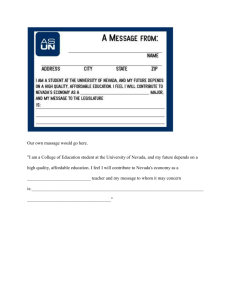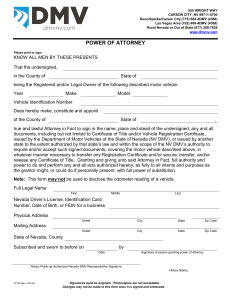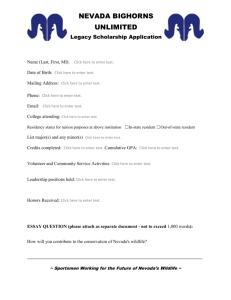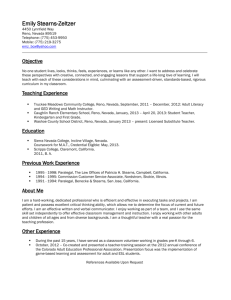In the Supreme Court
advertisement
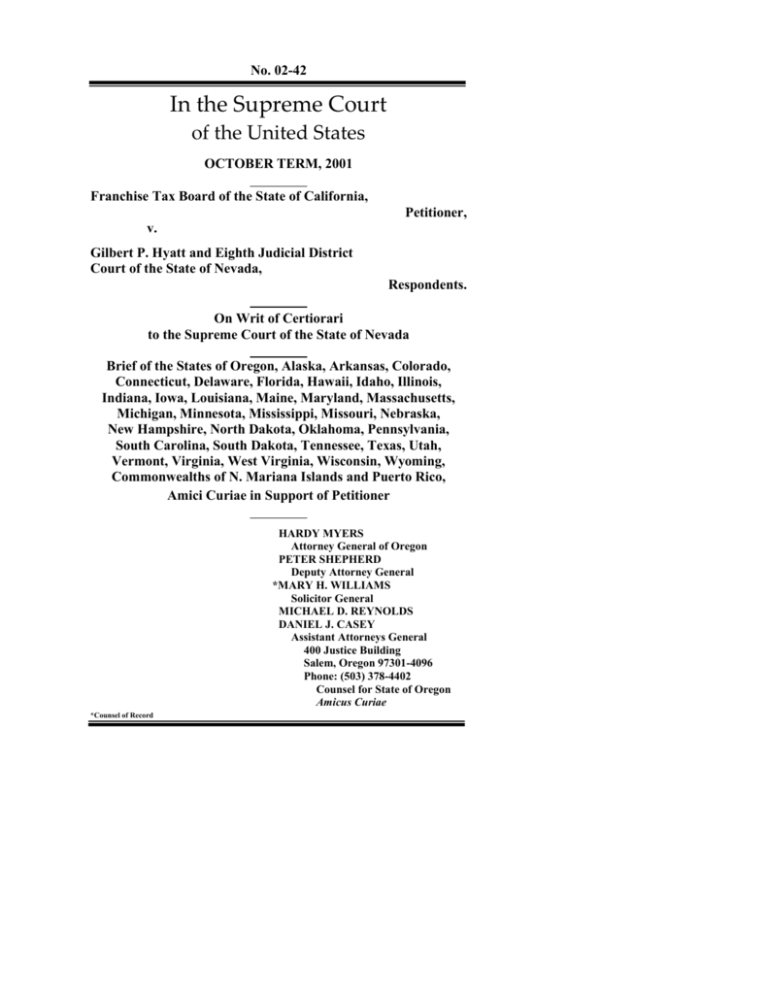
No. 02-42 In the Supreme Court of the United States OCTOBER TERM, 2001 Franchise Tax Board of the State of California, Petitioner, v. Gilbert P. Hyatt and Eighth Judicial District Court of the State of Nevada, Respondents. On Writ of Certiorari to the Supreme Court of the State of Nevada Brief of the States of Oregon, Alaska, Arkansas, Colorado, Connecticut, Delaware, Florida, Hawaii, Idaho, Illinois, Indiana, Iowa, Louisiana, Maine, Maryland, Massachusetts, Michigan, Minnesota, Mississippi, Missouri, Nebraska, New Hampshire, North Dakota, Oklahoma, Pennsylvania, South Carolina, South Dakota, Tennessee, Texas, Utah, Vermont, Virginia, West Virginia, Wisconsin, Wyoming, Commonwealths of N. Mariana Islands and Puerto Rico, Amici Curiae in Support of Petitioner HARDY MYERS Attorney General of Oregon PETER SHEPHERD Deputy Attorney General *MARY H. WILLIAMS Solicitor General MICHAEL D. REYNOLDS DANIEL J. CASEY Assistant Attorneys General 400 Justice Building Salem, Oregon 97301-4096 Phone: (503) 378-4402 Counsel for State of Oregon Amicus Curiae *Counsel of Record QUESTION PRESENTED Did the Nevada Supreme Court impermissibly interfere with California’s capacity to fulfill its sovereign responsibilities, in derogation of Article IV, section 1, by refusing to give full faith and credit to California Government Code section 860.2, in a suit brought against California for the torts of invasion of privacy, outrage, abuse of process, and fraud alleged to have occurred in the course of California’s administrative efforts to determine a former resident’s liability for California personal income tax? i TABLE OF CONTENTS Page Interest of Amici ............................................................................... 1 Jurisdiction ....................................................................................... 4 Argument ......................................................................................... 5 Conclusion ..................................................................................... 12 ii TABLE OF AUTHORITIES Page Cases Cited Alden v. Maine, 527 U.S. 706 (1999) ............................................................ 9 Anderson v. Dept. of Rev., 313 Or. 1, 828 P.2d 1001 (1992) ........................................ 2 Bandini Co. v. Superior Court, 284 U.S. 8 (1931) ................................................................ 4 Biscoe v. Arlington County, 738 F.2d 1352 (D.C. Cir. 1984), cert. den. 469 U.S. 1159 (1985) .......................................... 8 College Sav. Bank v. Florida Prepaid Postsecondary Educ. Expense Bd., 527 U.S. 666 (1999) ............................................................ 9 Cox Broadcasting Corp v. Cohn, 420 U.S. 469 (1975) ............................................................ 5 Federal Maritime Comm’n v. South Carolina Ports Authority, 535 U.S. ___, 122 S. Ct. 1864 (2002) ............................... 10 Fisher v. District Court, 424 U.S. 832 (1976) ............................................................ 4 Florida v. Thomas, 532 U.S. 774 (2001) ............................................................ 5 Flynt v. Ohio, 451 U.S. 619 (1981) ............................................................ 5 Guarini v. State of New York, 521 A.2d 1362 (N.J.Super.Ch.), aff’d 521 A.2d 1294 (N.J. Super.A.D. 1986), cert. den. 484 U.S. 817 (1987) ........................................ 7, 8 iii Hale v. Port of Portland, 308 Or. 508, 783 P.2d 506 (1989) ...................................... 2 Idaho v. Coeur d’Alene Tribe of Idaho, 521 U.S. 261 (1997) .......................................................... 10 Kimel v. Florida Bd. Of Regents, 528 U.S. 62 (2000) ............................................................ 10 Madruga v. Superior Court of California, 346 U.S. 556 (1954) ............................................................ 4 Nevada v. Hall, 440 U.S. 410 (1979) ................................ 1, 6, 7, 8, 9, 10, 11 Pacific Coast Dairy v. Department of Agriculture, 318 U.S. 285 (1943) ............................................................ 5 State of Montana v. Gilham, 133 F.3d 1133 (9th Cir. 1998) ............................................ 8 Struebin v. State of Illinois, 421 N.W. 2d 874 (Iowa Supr.), cert. den. 488 U.S. 851 (1982) ............................................ 8 Constitutional and Statutory Provisions 28 U.S.C. § 1257 (3) ............................................................... 4 28 U.S.C. § 1257(a) ................................................................ 4 OR. CONST. art. IV, § 24 ......................................................... 2 OR. REV. STAT. § 30.265(3)(2001) ......................................... 2 OR. REV. STAT. § 30.265(3)(b)(2001) ..................................... 2 iv INTEREST OF AMICI If followed by other states, the Nevada Supreme Court’s decision in this case will infringe on the capacity of States to perform a core governmental function – that of assessing and collecting taxes. Because that infringement involves the very danger this Court warned about in Nevada v. Hall, 440 U.S. 410, 424 n. 24 (1979), amici urge this Court to grant California’s petition for certiorari. Like petitioner California, many amici States tax the income of their residents as well as the income of non-residents derived from in-state sources. This tax represents a major portion of the operating funds these States need to perform their essential governmental functions. As part of their tax collection and assessment efforts, these States, like California, conduct audits of former residents now living in other States, or of individuals or corporations residing out-of-state that derive income from doing business in their State, to determine the existence and extent of any tax obligation owed.1 Many amici States cannot be sued in their own state courts for their conduct or activities in connection with residency audits or other tax collection matters.2 Oregon, for example, 1 Oregon, for example, annually conducts 120 to 150 audits of corporations doing business in Oregon but headquartered outside the State. The issues auditors review typically require out-of-state examination of corporate minutes and financial records. On the personal income tax side, Oregon audits nonresidents to determine the legitimacy of their non-residency status as well as claims of entitlement to special federal exemptions from state income taxes based on, inter alia, their employment with the airlines, barge companies or the federal government. 2 Amici States with specific statutes retaining immunity as to claims involving the assessment and collection of taxes include: Hawaii (HAW. REV. STAT. ANN. § 662-15(2) (Michie 2002)); Idaho (IDAHO CODE § 6904A(1) (Michie 1998)); Massachusetts (MASS. GEN. LAWS ANN. ch. 258, § 10(d) (West 1988 & Supp. 2002)); Minnesota (MINN. STAT. ANN. § 3.736, subd. (3)(C) (1998 & Supp. 2002), but see, e.g., MINN. STAT. sec- 2 has retained its sovereign immunity from suits involving the collection and assessment of taxes. Under Article IV, section 24 of the Oregon Constitution, the State is immune from suit except as it consents to suit by general law. Hale v. Port of Portland, 308 Or. 508, 514-18, 783 P.2d 506 (1989). While Oregon has chosen to waive its sovereign immunity from suit for torts committed by its agencies and employees generally, it retained that immunity for claims involving certain types of conduct or activities. See OR. REV. STAT. § 30.265(3)(2001). Prominent among those claims for which it retained immunity is “any claim in connection with the assessment and collection of taxes.” OR. REV. STAT. § 30.265(3)(b)(2001). See Anderson v. Dept. of Rev., 313 Or. 1, 7, 828 P.2d 1001 (1992).3 tions 270.275-.276 (1998 & Supp. 2002) (limitations on immunity)); Mississippi (MISS. CODE ANN. § 11-46-9(1)(I) (2002)); Nebraska (NEB. REV. STAT. § 81-8, 219(2) (1996)); Oklahoma (OKLA. STAT. ANN. tit. 51, § 155(11) (West 2000 & Supp. 2002)); South Dakota (S.D. CONST. art. III, § 27; S.D. CODIFIED LAWS §§ 21-32-16 to-18 (Michie 1987) §§ 3-22-10, 17) (Michie 1994)); Utah (UTAH CODE ANN. §§ 63-30-10(8), 59-1-704 (1997 & Supp. 2002)); Vermont (VT. STAT. ANN. tit. 12, § 5601(e)(2) (1973 & Supp. 2001)). Amici States with general sovereign immunity statutes that may apply to claims involving the assessment and collection of taxes include: Alaska (ALASKA STAT. § 09-50-250 (Lexis 2000); Arkansas (ARK. CODE ANN. tit. 10, §§ 4011, 4012 (1999)); Illinois (745 ILL. COMP. STAT. 5/1) (1993); Indiana (IND. CODE §§ 34-13-2-1, -3-1, -4-1 (1999 & Supp. 2002)); Louisiana (LA. REV. STAT. ANN. § 42.1441.A (WEST 1990)); Maine (ME. REV. STAT. ANN. tit. 14, § 8103.1 (WEST 1980)); Wisconsin (WIS. STAT. ANN. § 893.80 (WEST 1997 & Supp. 2001)). 3 In Anderson, the court observed that Oregon had enacted refund statutes by which disgruntled taxpayers could challenge what they believed to be the collection of improper taxes and that, in doing so, Oregon had waived its immunity in a limited sense. Thus, taxpayers who believe taxes have been collected from them in an invalid manner do have some recourse against the State. 3 If other States follow the Nevada Supreme Court’s lead, Oregon and amici States that have retained tax-collection immunity will be subject to the jurisdiction of and liability in the courts of another State for performing a core governmental function. That is, their policy decision to retain their sovereign immunity means sovereign immunity only in their own courts and in federal courts, except to the extent they have consented to suit. The value of that immunity will be significantly impaired if they can be sued in Nevada or the courts of another State that — like Nevada — has decided to limit or abandon sovereign immunity for claims involving its own conduct.4 The mere possibility that States conducting residency-tax audits or other investigations of potential tax liability of nonresidents could be subject to this type of litigation in a foreign State literally sends chills down the spines of state tax administrators. All States face shrinking monetary resources. They must be vigilant in collecting every legitimate dollar of tax revenue. Taxpayers with the most to lose—like respondent Hyatt in the present case—have every incentive to follow respondent’s lead, citing the Nevada court’s decision, in an effort to forestall, if not thwart entirely, states’ legitimate taxcollection efforts. States cannot afford to lose the revenue such investigations and tax audits produce; yet many cannot afford to become embroiled even in one drawn-out, expensive, audit-related lawsuit of the kind California faces in this case.5 4 Such concerns are not far fetched. Oregon currently is auditing a taxpayer claiming to have changed residency to Nevada prior to an $8 million dollar sale of stock. Fortunately, for now at least, the taxpayer is cooperating with the audit. 5 California reportedly has incurred to date over $2.5 million in legal costs, including out-of-state attorney fees, defending this lawsuit. The entire legal services budget for the Oregon Department of Revenue for the 4 Only this Court can clarify whether a state’s retention of sovereign immunity as to conduct involving core governmental functions is entitled to respect in the courts of another State. Without this Court’s resolution of that question, States throughout the country likely will be called to answer and defend in foreign courts claims that they have misused or abused their authority in attempting to collect taxes due their States. This is costly, wasteful litigation that can be avoided only by this Court resolving the question now. Amici States thus urge the court to grant certiorari and clarify that a state’s retained immunity from suit as to core governmental functions is entitled to respect in the courts of a sister State, regardless of the immunity-retention position taken by that sister State as to its own, similar conduct. JURISDICTION Although the Nevada Supreme Court’s decision in this case contemplates that further proceedings will occur in the state’s trial court, this Court’s authorities make clear that the decision is nevertheless one over which this Court has jurisdiction. The state court’s decision is a “final judgment” within the meaning of 28 U.S.C. § 1257(a) for at least two reasons. First, the decision finally disposes of an original proceeding brought by California in the Nevada Supreme Court. See, Fisher v. District Court, 424 U.S. 832, 385 n. 7 (1976) (holding that a writ of supervisory control issued by the Montana Supreme Court is a final judgment for purposes of 28 U.S.C. § 1257 (3)); Madruga v. Superior Court of California, 346 U.S. 556, 557 n. 1 (1954) (holding that the California Supreme Court’s judgment “finally disposing of the writ of prohibition is a final judgment reviewable here under 28 U.S.C. § 1257.”); Bandini Co. v. Superior Court, 284 U.S. 8, 14-15 2001–03 biennium is $2.9 million, and most of that budget is required to provide legal support for its property tax program. 5 (1931) (same). See also Pacific Coast Dairy v. Department of Agriculture, 318 U.S. 285 (1943) (accepting jurisdiction, without discussion, of California Supreme Court decision denying petition for writ of mandamus). Second, the Nevada Supreme Court’s decision fits the fourth of four categories of state-court decisions this Court identified in Cox Broadcasting Corp v. Cohn, 420 U.S. 469 (1975), as satisfying the finality requirement even though further proceedings were to take place in the state court. The fourth category is satisfied here because the court’s decision fully decided the federal issue (i.e., whether the Full Faith and Credit Clause barred Nevada courts from asserting jurisdiction over California under the circumstances presented), reversal of the Nevada judgment would preclude further litigation in the state’s lower courts, and this Court’s refusal to review the issue might seriously erode federal policy underlying the Full Faith and Credit Clause. See Florida v. Thomas, 532 U.S. 774 (2001) (explaining and applying the four categories of cases identified in Cox Broadcasting); Flynt v. Ohio, 451 U.S. 619, 620-622 (1981) (rejecting Flynt’s argument that the Ohio Supreme Court’s reversal on appeal of a trial court judgment dismissing state criminal complaints against him satisfied the fourth category, based on the Court’s determination that there was “no federal policy that will suffer if the state criminal proceeding goes forward.”) As discussed infra, subjecting California to the jurisdiction of and a trial in the State of Nevada, thereby causing California effectively to lose the benefit of its retention of immunity, will erode federal policies underlying the recognition of immunity. ARGUMENT 1. In Nevada v. Hall, this court allowed California courts to assume jurisdiction over the State of Nevada in a tort claim arising from a State of Nevada employee’s traffic accident with a California resident in California. In doing so this Court 6 rejected Nevada’s argument that allowing California to assume jurisdiction over Nevada violated the Full Faith and Credit Clause. This Court further rejected Nevada’s plea, also based on the Full Faith and Credit Clause, that California apply Nevada’s $25,000 tort-claim limits rather than California’s unlimited recovery statute. This Court concluded that California’s assumption of jurisdiction and rejection of Nevada’s tort-claim limits was permissible because doing otherwise would be “obnoxious to its statutorily based policies of jurisdiction over nonresident motorists and full recovery,” and, hence, not required by the Full Faith and Credit Clause. 440 U.S. at 424. This Court, however, went out of its way to note that by exercising jurisdiction in that case, California was not posing a “substantial threat to our constitutional system of cooperative federalism.” 440 U.S. at 424, n. 24. Hall, after all, involved only a traffic accident, and allowing such a case to proceed in California “could hardly interfere with Nevada’s capacity to fulfill its own sovereign responsibilities.” Ibid. The Court added that it had “no occasion, in this case, to consider whether different state policies, either of California or of Nevada, might require a different analysis or a different result.” Ibid. This Court thus implied that, were the lawsuit of a kind that would or might interfere with Nevada’s capacity to fulfill its own sovereign responsibilities, a different result might obtain. At a minimum, however, this Court was clear that its decision did not signal how it would rule in a case where a foreign court’s assumption of jurisdiction would interfere with another state’s ability to carry out its core governmental duties. The present case is that case. In reaching its decision, however, the Nevada Supreme Court ignored Hall’s cautionary footnote. The state court analyzed the Full Faith and Credit Clause issue as if California 7 merely had been involved in an automobile accident in Nevada. That the acts of which plaintiff was complaining arose out of California’s exercise of core governmental functions, and that the maintenance of this lawsuit in Nevada posed a severe drain on California’s resources, thereby seriously impeding its ability to carry out those core functions, were of no consequence in the court’s analysis. Amici submit that these factors not only are relevant in the proper analysis but, when properly considered, militate in favor of a result contrary to that reached by the Nevada Supreme Court. This case gives the Court the opportunity to explain the proper analysis to be employed when a State asserts that a foreign state’s assumption of jurisdiction, or failure to respect the state’s retained sovereign immunity, would adversely impact the state’s ability to carry out its core governmental responsibilities. 2. State and other lower courts need guidance in the application of Hall and the Full Faith and Credit Clause in cases where those courts are asked to assume jurisdiction over other States in connection with their exercise of core governmental duties. Some state courts have construed the “cooperative federalism” language in Hall as an absolute jurisdictional bar to suits implicating another state’s core governmental functions. For example, in Guarini v. State of New York, 521 A.2d 1362 , 1368 (N.J.Super.Ch.), aff’d 521 A.2d 1294 (N.J. Super.A.D. 1986), cert. den. 484 U.S. 817 (1987) (cited in California’s petition for certiorari, p. 12), a New Jersey court declined to assert jurisdiction over a suit filed by New Jersey residents and politicians challenging New York’s authority over the Statute of Liberty and various Hudson River islands. 521 A.2d at 1368. Although located closer to New Jersey’s side of the river, those islands had been under New York’s authority for more than 150 years pursuant to an 1834 Congressionally approved compact between the two states. 521 A.2d at 1364. The Guarini court reasoned: 8 Residents of New Jersey are attempting here to challenge the governmental authority of New York over territory which by interstate compact is under New York’s jurisdiction. Permitting this suit would violate principles of cooperative federalism and interfere with New York’s exercise of sovereign responsibilities pursuant to that interstate compact. (citing Hall, 440 U.S. at 424, n. 24). See also Struebin v. State of Illinois, 421 N.W. 2d 874 (Iowa Supr.), cert. den. 488 U.S. 851 (1982) (Struebin II) (citing suit in Guarini as type of threat to cooperative federalism about which Hall warned); State of Montana v. Gilham, 133 F.3d 1133, 1138 (9th Cir. 1998) (assuming Hall extended to suits brought in tribal court, it did not apply to suit that “directly implicates the exercise of Montana’s sovereign functions. Gilham would hold Montana liable for its governmental decisions concerning highway design. This is far different from respondeat superior tort liability, which would normally only have financial effect. Because the suit’s theory would affect governmental processes, it falls outside the scope of Nevada v. Hall.”). At the other end of the spectrum are courts treating Hall’s cautionary footnote as having no meaning at all. Such was the case in Biscoe v. Arlington County, 738 F.2d 1352 (D.C. Cir. 1984), cert. den. 469 U.S. 1159 (1985), which involved a high-speed police pursuit from Virginia to the District of Columbia, a subsequent auto accident, and a negligence action filed in a D.C. court by injured D.C. residents against the Virginia county. Based on footnote 24 in Hall, the Virginia county asserted immunity on the grounds that the plaintiffs’ action “undermines [the county’s] capacity to fulfill its law enforcement responsibilities.” 738 F.2d at 1358. The D.C. Circuit rejected that argument. First, it reasoned that the cited footnote in Hall 9 does not in any respect limit the holding to the facts of that case. Nor does the footnote suggest that an exception must ever be made to the principles articulated in the opinion. 738 F.2d at 1358. Second, and in any event, the court indicated that the footnote would not have any impact here because the conduct of which plaintiff complained occurred outside Virginia’s borders. * * * Arlington County itself expressly recognizes that its law enforcement interests weaken—and will yield to other interests—when it acts outside Virginia’s borders. * * * The result is that the threat to the County’s sovereignty is considerably less, and the threat to another entity’s sovereignty is considerably greater than * * * where a state has acted only within its own borders. In sum, application of Virginia’s policy would clearly frustrate District policies in favor of deterrence and compensation, and the facts of this case warrant no further inquiry into the meaning of the quoted footnote. 738 F.2d at 1358. 3. Providing state and other lower courts with guidance on these issues is timely, particularly in light of the profound concern that this Court has articulated since Nevada v. Hall for the sovereignty of states vis a vis the federal government. See Alden v. Maine, 527 U.S. 706 (1999) (Congress by authorizing private actions against non-consenting States in state court under the Fair Labor Standards Act unconstitutionally abrogated state sovereign immunity); College Sav. Bank v. Florida Prepaid Postsecondary Educ. Expense Bd., 527 U.S. 666 (1999) (same regarding actions in federal court under the Federal Trademark Remedy Clarification Act); Kimel v. Florida Bd. Of Regents, 528 U.S. 62 (2000) (same regarding the 10 federal Age Discrimination in Employment Act); Idaho v. Coeur d’Alene Tribe of Idaho, 521 U.S. 261, 281 (1997) (acknowledging the inapplicability of the Ex Parte Young doctrine in actions implicating special sovereign interests). See also Federal Maritime Comm’n v. South Carolina Ports Authority, 535 U.S. ___, 122 S. Ct. 1864, 1874 (2002) (state sovereign immunity “bars the FMC from adjudicating complaints filed by a private party against a nonconsenting State.”) Against the backdrop of these cases, it is appropriate for this Court to revisit Nevada v. Hall, not necessarily for the purpose of overruling that decision, but for examining whether in light of the renewed emphasis on state sovereignty the Full Faith and Credit Clause, under some circumstances at least, mandates that a foreign State give full credit to a sister state’s retention of its sovereign immunity. Not only is it in the interests of other States to have this Court examine the issue presented in this case now, it is in California’s interests as well. One perhaps overarching reason for a state’s retention of immunity for conduct involving core governmental functions is to prevent state officials engaged in that conduct from altering their behavior out of fear of becoming embroiled in litigation that takes them away from their governmental duties. If a decision denying immunity cannot be reviewed pre-trial, the immunity is “effectively lost.” See, e.g., Mitchell v. Forsyth, 472 U.S. 511, 526-27 (1985) (“The reasoning that underlies the immediate appealability of an order denying absolute immunity indicates to us that the denial of qualified immunity should be similarly appealable” – i.e., the “entitlement is immunity from suit rather than a mere defense to liability; and like an absolute immunity, it is effectively lost if a case is erroneously permitted to go to trial.”) Cf Federal Maritime Comm’n v. South Carolina Ports Authority, 122 S. Ct. 1877 (sovereign immunity “provides an immunity from suit” and “does not merely constitute a defense to monetary liability or even to all types of liability.”); Puerto Rico 11 Aqueduct and Sewer Authority v. Metcalf Eddy, Inc., 506 U.S 139, 146 (1993) (“The very object and purpose of the 11th Amendment were to prevent the indignity of subjecting a State to the coercive process of judicial tribunals at the instance of private parties.” (quoting In re Ayers, 123 U.S. 443, 505 (1887)). The Nevada Supreme Court’s refusal to give due respect to California’s retained immunity has caused California to expend significant financial resources and to divert officials and employees from their primary governmental duties in order to defend against respondent Hyatt’s claims. That expense and consequent reduction in service to the citizens of California will only continue to mount if California is required to defend against these claims on the merits. Only by agreeing to resolve the issue presented now can this Court give California some practical relief. 4. For cooperative federalism to flourish, it is critical that States give due respect to other states’ decisions to retain immunity from suit regarding core governmental activities. Amici believe that the majority in Nevada v. Hall included footnote 24 to recognize the fundamental importance to cooperative federalism of States not infringing on the “capacity” of other States to fulfill their own “sovereign responsibilities,” and to respond to concerns that failing to give due respect in such cases would increase the opportunity and likelihood of retaliation. See Nevada v. Hall, 440 U.S. at 429 (Blackmun, J., dissenting) (“States in all likelihood will retaliate against one another for respectively abolishing the ‘sovereign immunity’ doctrine.”); id. at 443 (Rehnquist, J., dissenting) (States will “try to isolate assets from foreign judgments and generally reduce their contacts with other jurisdictions.”). The failure of States to recognize other states’ retention of immunity as to conduct involving core governmental functions will likely cause affected States to be less cooperative in their dealings 12 with, and perhaps less trustful of, those States. These consequences are the antithesis of cooperative federalism. Unless this Court intervenes now, certainly some— perhaps many—taxpayers will follow respondent Hyatt’s path and seek to block states’ legitimate tax collection efforts, hoping that by dragging States through the judicial processes of foreign courts States will forego those efforts. The Nevada Supreme Court’s decision provides a roadmap for disgruntled taxpayers and other state courts to follow. While other courts faced with having to process these cases may ultimately disagree with the Nevada Supreme Court’s decision, still the process itself, as is evident in this case, will be time-consuming, expensive and detrimental to states’ ability to perform this core governmental responsibility. CONCLUSION The question raised in this case is squarely presented and, so far as amici States are aware, free of procedural irregularities. Amici implore the Court to grant certiorari and reverse the decision of the Nevada Supreme Court. Respectfully submitted, HARDY MYERS Attorney General of Oregon PETER SHEPHERD Deputy Attorney General MARY WILLIAMS Solicitor General MICHAEL D. REYNOLDS DANIEL J. CASEY Assistant Attorneys General Counsel for Amicus Curiae State of Oregon September 6, 2002 App-1 APPENDIX A LIST OF THE AMICI CURIAE State of Alaska Bruce M. Botelho Attorney General Diamond Courthouse P.0. Box 110300 Juneau, Alaska 99811-0300 State of Arkansas Mark Pryor Attorney General 200 Tower Building 323 Center Street Little Rock, Arkansas 72201-2610 State of Colorado Ken Salazar Attorney General 1525 Sherman Street, 7th Floor Denver, Colorado 80203 State of Connecticut Richard Blumenthal Attorney General 55 Elm Street P.O. Box 120 Hartford, Connecticut 06141-0120 State of Delaware M. Jane Brady Attorney General 820 North French Street Wilmington, Delaware 19801 App-2 State of Florida Robert A. Butterworth Attorney General The Capitol PL 01 Tallahassee, Florida 32399-1050 State of Hawaii Earl I. Anzai Attorney General 425 Queen Street Honolulu, Hawaii 96813 State of Idaho Alan G. Lance Attorney General P.O. Box 83720 Boise, Idaho 83720-0010 State of Illinois James E. Ryan Attorney General State of Illinois Center 12th Floor 100 West Randolph Street Chicago, Illinois 60601 State of Indiana Steve Carter Attorney General Indiana Government Center-So. 5th Floor 402 West Washington Street Indianapolis, Indiana 46204 App-3 State of Iowa Thomas J. Miller Attorney General Hoover State Office Building Second Floor Des Moines, Iowa 50319 State of Louisiana Richard P. Ieyoub Attorney General P.O. Box 94005 Baton Rouge, Louisiana 70804 State of Maine G. Steven Rowe Attorney General Office of the Attorney General Six State House Station Augusta, Maine 04333-0006 State of Maryland J. Joseph Curran, Jr. Attorney General 200 Saint Paul Place Baltimore, Maryland 21202 State of Massachusetts Thomas F. Reilly Attorney General One Ashburton Place Boston, Massachusetts 02108-1698 State of Michigan Jennifer M. Granholm Attorney General P.0. Box 30212 Lansing, Michigan 48909 App-4 State of Minnesota Mike Hatch Attorney General 102 State Capitol 75 Dr. Martin Luther King, Jr. Blvd. St. Paul, Minnesota 55155 State of Mississippi Mike Moore Attorney General P.0. Box 220 Jackson, Mississippi 39205 State of Missouri Jeremiah W. (Jay) Nixon Attorney General Supreme Court Building 207 West High Street P.0. Box 899 Jefferson City, Missouri 65101 State of Nebraska Don Stenberg Attorney General Department of Justice 2115 State Capitol Lincoln, Nebraska 68509 State of New Hampshire Philip T. McLaughlin Attorney General 33 Capitol Street Concord, New Hampshire 03301-6397 App-5 State of North Dakota Wayne Stenehjem Attorney General State Capitol 600 East Boulevard Avenue Bismarck, North Dakota 58505-0040 Commonwealth of the Northern Mariana Islands Robert Tenorio Torres Attorney General P.O. Box 1007 Saipan, MP 96950 State of Oklahoma W.A. Drew Edmndson Attorney General State Capitol 2300 N. Lincoln Boulevard Room 112 Oklahoma City, Oklahoma 73105 State of Pennsylvania D. Michael Fisher Attorney General 16th Floor Strawberry Square Harrisburg, Pennsylvania 17120 Commonwealth of Puerto Rico Honorable Annabelle Rodriguez Attorney General Office of the Attorney General P.O. Box 192 San Juan, Puerto Rico 00902-0192 App-6 State of South Carolina Charles M. Condon Attorney General P.O. Box 11549 Columbia, South Carolina 29211 State of South Dakota Mark Barnett Attorney General 500 East Capitol Avenue Pierre, South Dakota 57501-5070 State of Tennessee Paul G. Summers Attorney General 500 Charolotte Avenue P.O. Box 20207 Nashville, Tennessee 37202-0207 State of Texas John Cornyn Attorney General Capitol Station P.0. Box 12548 Austin, Texas 78711-2548 State of Utah Mark L. Shurtleff Attorney General 236 State Capitol Salt Lake City, Utah 84114 State of Vermont William H. Sorrell Attorney General 109 State Street Montpelier, Vermont 05609-1001 App-7 State of Virginia Jerry Kilgore Attorney General 900 East Main Street Richmond, Virginia 23219 State of West Virginia Darrell V. McGraw, Jr. Attorney General State Capitol 1900 Kanawha Boulevard East Charleston, West Virginia 25305 State of Wisconsin James E. Doyle Attorney General 114 East, State Capitol P.0. Box 7857 Madison, Wisconsin 53707-7857 State of Wyoming Hoke MacMillan Attorney General 123 State Capitol Building Cheyenne, Wyoming 82002
